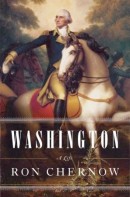A weekly roundup of noteworthy reviews from other sources.
 Douglas Brinkley raves about Ron Chernow’s new biography of George Washington: “an epic, cradle-to-grave biography destined to win a slew of book awards. A Brooklyn native best known for his brilliant studies of Alexander Hamilton and John D. Rockefeller, Chernow displays a breadth of knowledge about Washington that is nothing short of phenomenal.” . . . Jill Lepore counters that enthusiasm, writing, “Chernow’s aim is to make of Washington something other than a ‘lifeless waxwork,’ an ‘impossibly stiff and wooden figure, composed of too much marble to be quite human.’ That has been the aim of every Washington biographer, and none of them have achieved it.” Lepore finds plenty of interest in Chernow’s book, but feels the final product suffers from applying modern-day context to Washington’s era: “Washington: A Life is a prodigious biography, expertly narrated and full of remarkable detail. But it is a psychological profile of a man who lived and died long before our psychological age, a romantic portrait of a man who was not a Romantic.” . . . Todd Gitlin says the Cold War may be over, but John le Carré’s ” flair for the gut-wrenching drama of betrayed honor” is strong as ever: “He is professionally interested in how hard it is to clean dirty hands, and his sympathies are always with those who make the effort, even if they are doomed.” . . . Amy Benfer reviews Myla Goldberg’s new novel, in which a grown woman reconsiders the role she may have had in the disappearance of a friend during childhood. . . . Allen Barra reviews Jane Leavy’s new biography of Mickey Mantle: “[Leavy] records Mantle’s sins and achievements with the diligence of a first-rate reporter, never losing sight of what drew her to Mickey as a fan in the first place.” . . . Stephen Hawking once left the door open for the existence of God. Peter Galison says Hawking’s latest argues that science doesn’t need God to complete its picture. . . . Russell Stannard’s new book, The End of Discovery, is meant, in part, as a response to books like Hawking’s. The Economist says a response is good idea, but that Stannard’s is “unsatisfactory . . . rushed and lumpy.”
Douglas Brinkley raves about Ron Chernow’s new biography of George Washington: “an epic, cradle-to-grave biography destined to win a slew of book awards. A Brooklyn native best known for his brilliant studies of Alexander Hamilton and John D. Rockefeller, Chernow displays a breadth of knowledge about Washington that is nothing short of phenomenal.” . . . Jill Lepore counters that enthusiasm, writing, “Chernow’s aim is to make of Washington something other than a ‘lifeless waxwork,’ an ‘impossibly stiff and wooden figure, composed of too much marble to be quite human.’ That has been the aim of every Washington biographer, and none of them have achieved it.” Lepore finds plenty of interest in Chernow’s book, but feels the final product suffers from applying modern-day context to Washington’s era: “Washington: A Life is a prodigious biography, expertly narrated and full of remarkable detail. But it is a psychological profile of a man who lived and died long before our psychological age, a romantic portrait of a man who was not a Romantic.” . . . Todd Gitlin says the Cold War may be over, but John le Carré’s ” flair for the gut-wrenching drama of betrayed honor” is strong as ever: “He is professionally interested in how hard it is to clean dirty hands, and his sympathies are always with those who make the effort, even if they are doomed.” . . . Amy Benfer reviews Myla Goldberg’s new novel, in which a grown woman reconsiders the role she may have had in the disappearance of a friend during childhood. . . . Allen Barra reviews Jane Leavy’s new biography of Mickey Mantle: “[Leavy] records Mantle’s sins and achievements with the diligence of a first-rate reporter, never losing sight of what drew her to Mickey as a fan in the first place.” . . . Stephen Hawking once left the door open for the existence of God. Peter Galison says Hawking’s latest argues that science doesn’t need God to complete its picture. . . . Russell Stannard’s new book, The End of Discovery, is meant, in part, as a response to books like Hawking’s. The Economist says a response is good idea, but that Stannard’s is “unsatisfactory . . . rushed and lumpy.”

